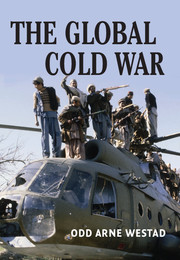Book contents
- Frontmatter
- Contents
- List of illustrations
- List of maps
- Acknowledgments
- List of abbreviations
- Introduction
- 1 The empire of liberty: American ideology and foreign interventions
- 2 The empire of justice: Soviet ideology and foreign interventions
- 3 The revolutionaries: anticolonial politics and transformations
- 4 Creating the Third World: the United States confronts revolution
- 5 The Cuban and Vietnamese challenges
- 6 The crisis of decolonization: Southern Africa
- 7 The prospects of socialism: Ethiopia and the Horn
- 8 The Islamist defiance: Iran and Afghanistan
- 9 The 1980s: the Reagan offensive
- 10 The Gorbachev withdrawal and the end of the Cold War
- Conclusion: Revolutions, interventions, and great power collapse
- Notes
- Index
6 - The crisis of decolonization: Southern Africa
Published online by Cambridge University Press: 05 December 2012
- Frontmatter
- Contents
- List of illustrations
- List of maps
- Acknowledgments
- List of abbreviations
- Introduction
- 1 The empire of liberty: American ideology and foreign interventions
- 2 The empire of justice: Soviet ideology and foreign interventions
- 3 The revolutionaries: anticolonial politics and transformations
- 4 Creating the Third World: the United States confronts revolution
- 5 The Cuban and Vietnamese challenges
- 6 The crisis of decolonization: Southern Africa
- 7 The prospects of socialism: Ethiopia and the Horn
- 8 The Islamist defiance: Iran and Afghanistan
- 9 The 1980s: the Reagan offensive
- 10 The Gorbachev withdrawal and the end of the Cold War
- Conclusion: Revolutions, interventions, and great power collapse
- Notes
- Index
Summary
From the mid-1960s onwards it was clear to both Washington and Moscow that the focus for Cold War competition in Africa was shifting from North and Central Africa to the southern part of the continent, where both the remnants of the Portuguese empire – in Angola and Mozambique – and the white supremacist states of South Africa and Zimbabwe (Rhodesia) were confronting guerrilla wars by African nationalist movements. Much of the leadership of these movements belonged to the second and more radical generation of African nationalists – some were Marxists and most were critical of the failings of the first African postindependence leaders to set their countries and the continent on a course toward more unity, more equality, and less European influence. Many were inspired by what they considered to be the lessons of the wars in Vietnam and in Cuba, believing that guerrilla warfare and mass political mobilization would defeat their enemies, while preparing their societies for the postwar building of a socialist state. The increasingly important international role of the Soviet Union made many radical African leaders see Moscow as the global socialist counterweight to the United States, both providing a balance in international affairs that would help their revolutions and also assisting their movements with training, weapons, and supplies. It was the Marxist orientation of many Southern African liberation movements that made both Moscow and Washington take notice of their significance – to the United States, they threatened radical, Soviet-oriented regimes taking power in the Third World; to the Soviet Union, they hailed the beginning of a new stage of Third World social development, in which African leaders acknowledged the superiority of “scientific Marxism.”
- Type
- Chapter
- Information
- The Global Cold WarThird World Interventions and the Making of Our Times, pp. 207 - 249Publisher: Cambridge University PressPrint publication year: 2005
- 2
- Cited by

